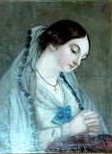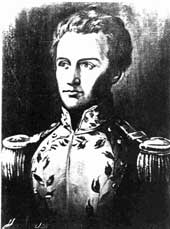
|
St. Patrick's Day in Peru, 1824 By Brian McGinn Published by www.irishdiaspora.net. An earlier version of this article originally appeared in Irish Roots magazine, N° 1, 1995, pp. 26-27. |
|||||||
|
Page 1 |
|||||||
|
|
|||||||
|
As Irish emigrants have scattered across the globe, St. Patrick has been honoured in unexpected ways and places. But a Peruvian celebration of 1824 was unique. Indeed, it is doubtful that Ireland's patron saint was feted before - or since - in the Andean mountain village of Huamachuco. And if he was, it is unlikely that the celebration had such fateful effects on the lives of its participants. |
|||||||
|
|
|||||||
|
|
The three Irishmen who gathered that cold summer [1] night in Peru were soldiers in the army of Simón Bolívar, the hero of South America's war for independence. Bolívar's struggle against Spain had won sympathy and support in Ireland. At least 2,500 Irish soldiers and sailors joined Bolívar's cause. [2] Daniel O'Connell sent his teenage son Morgan to fight in Venezuela [3], and in 1826 O'Connell borrowed for himself the title originally bestowed on Bolívar in 1813: The Liberator. [4]
The stage for this 1824 gathering had been set some months earlier, when Colonel Francis Burdett O'Connor [5], a Cork-born battalion commander, had landed in Peru. O'Connor was handed two bottles of Irish whiskey by the captain of his transport ship, an Irishman named Simpson. 'When you meet up with some of our fellow countrymen,' the skipper told O'Connor, 'these will help you celebrate the feast of our patron saint'. [6] Packed carefully in straw, the whiskey had followed O'Connor from the tropical coast to the frigid mountains. Busy with urgent military missions, O'Connor had let March 17 slip by uncelebrated. Some weeks later, Bolívar provided the opportunity for a belated observance when he called all his officers to a council-of-war at his highland camp. [7] O'Connor rode to Huamachuco in the company of Bolívar's favourite general, a dashing young Venezuelan named Antonio José de Sucre. Two years before, Sucre had liberated Ecuador when he routed the Spanish army on the outskirts of Quito, the capital. [8] But the twenty-nine year old Sucre now had love rather than war on his mind. During celebrations of his great victory in Quito, Sucre had met and been smitten by a seventeen year old Ecuadorean heiress, Mariana Carcelén y Larrea. [9] As the eldest daughter of a wealthy and pretentious aristocrat, Mariana inherited the grandiose title of Marchioness of Solanda. The teenager had little interest in settling down, and it was her father who engineered her betrothal to Sucre before he left Quito to liberate Peru. In an age when young women were always chaperoned, Mariana's father plotted to find Sucre alone in Mariana's company. Feigning shock, the father demanded that Sucre immediately ask for the hand of the daughter whose honour he had compromised, and the flustered hero agreed. [10]
|
||||||
|
Mariana however, did not feel bound by such conventions. With Sucre back at war, and her father dead, the flirtatious marchioness [11] soon caught the eye of another visiting hero, Colonel Arthur Sandes. The second of six sons of Alicia Browne and Henry Sandes of Glenfield, County Kerry, [12] Arthur was a veteran of the Napoleonic Wars before joining Bolívar in 1817. [13] By May 1819, the Kerryman was commanding Bolívar's Rifles Battalion, and three months later received a field promotion to Lieutenant Colonel after leading a charge against Spanish cannon. [14]
Sandes, apparently unaware of Mariana's prior engagement to Sucre, was not shy about popping the question. And the whimsical quiteńa promptly agreed to marry the handsome Irishman. Word of this turn of events soon reached Sucre, but the general had held his tongue, waiting for an opportune moment to confront his Irish subordinate. [15] On reaching Huamachuco, Bolívar's Irish officers wasted no time in finding each other. The night after he arrived, O'Connor was visited by Sandes. The two Irish colonels were soon joined by Captain William Owens Ferguson, the eldest son of John Ferguson of Ballinderry, County Antrim and Agnes Knox, his wife. Problems with his family and finances at home drove the headstrong Ulster youth to South America, where he joined Bolívar's forces at the age of eighteen. [16] Ferguson's younger brother, Samuel, had a more settled disposition, and achieved fame as a distinguished poet - he wrote 'The Lark in the Clear Air' and 'Lament for Thomas Davis' - and as president of the Royal Irish Academy. [17] William, only twenty-four years old at Huamachuco, was destined to achieve his own measure of immortality before reaching the age of thirty. The reminiscences of the trio were abruptly interrupted when Sucre strode into their hut. 'Sandes,' said the general, 'I know that you are planning to marry the daughter of the Marquis of Solanda. But I also wish to marry this girl.' [18]
|
|||||||
| Last Update: January 2005 | |||||||
| Please contact us if you have a question or wish to suggest changes |
|



